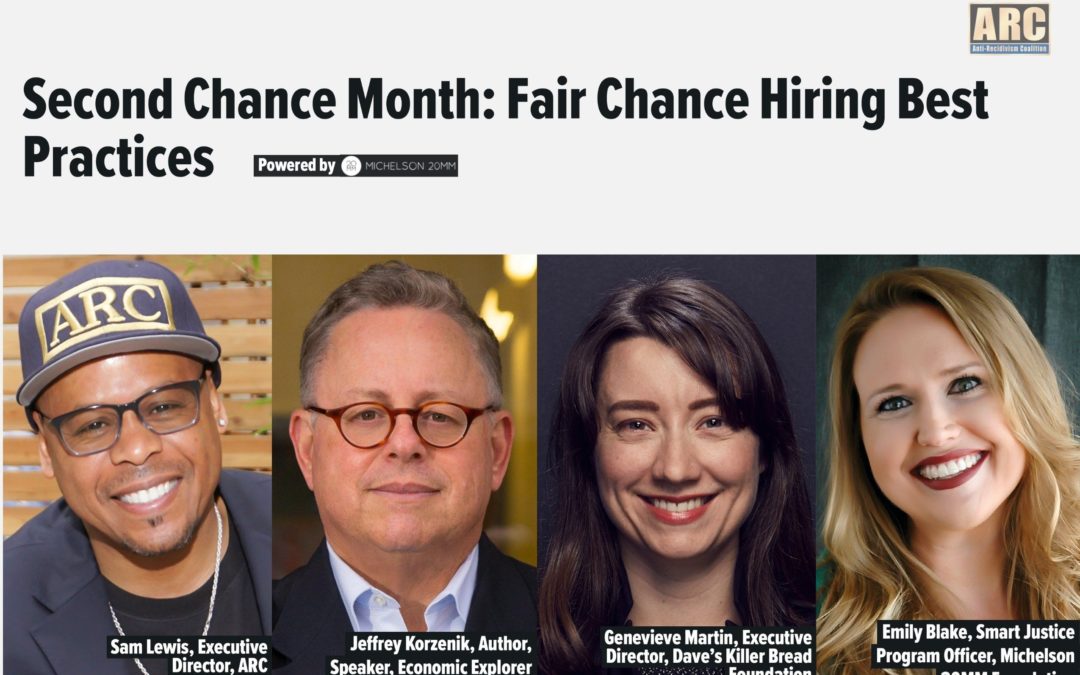April was Second Chance Month, a time to focus on affording the opportunity for individuals returning home from incarceration to fully reintegrate into society and the need to address the harmful consequences of mass incarceration. Fair Chance Hiring is more than a moral imperative to right the wrongs of mass incarceration; the United States experiences a $78 to 87 billion loss to annual GDP due to not including justice-involved talent in the workforce. Smart justice requires hiring, onboarding, retaining, and promoting formerly incarcerated candidates as essential to our collective economic prosperity–these factors are why the Michelson 20MM Foundation awarded Spark Grant to the Anti-Recidivism Coalition (ARC) to advance Fair Chance Hiring.
In honor of Second Chance Month, the Michelson 20MM Foundation’s Smart Justice Initiative partnered with the Anti-Recidivism Coalition (ARC) to launch the ARC Fair Chance Hiring Series, Powered by Michelson 20MM. While we know that employment is a critical component of successful reentry, securing employment after incarceration is often–if not always–challenging due to the stereotypes and stigmas associated with incarceration. The Series addresses these stereotypes and stigmas head-on by highlighting Fair Chance Hiring legal requirements, best practices, employers, and formerly incarcerated talent excelling in the workforce.
With over 70 million individuals navigating the workforce with a record, it is imperative to transform stigmas and stereotypes in corporate America. On April 16, 2021, ARC convened partners to discuss Fair Chance Hiring Best Practices. The conversation explored the archaic hiring stigma around conviction histories, best practices for fair chance hiring, and the economic imperative for hiring candidates with records. Sam Lewis, Executive Director of ARC, facilitated a discussion with Jeffrey Korzenik, Author of Untapped Talent, Genevieve Martin, Executive Director of Dave’s Killer Bread Foundation, and Emily Blake, Smart Justice Program Officer at the Michelson 20MM Foundation.
Highlights and key takeaways from the event include the importance of demystifying the false assumptions companies often make about justice involved candidates, highlighting employer incentives for fair chance hiring like bonding and tax credits, as well as applying fair chance best practices not only to companies, but also to hiring in government and institutions of higher education. Sam pointed out that we often refer to Fair Chance Hiring as “Second Chance,” similar to Second Chance Month, which is not entirely accurate because this is often the first chance a formerly incarcerated person–typically from an under resourced community–has to become the best version of themselves.
Dave’s Killer Bread (DKB) is a great example of an organization that embraces Fair Chance Hiring. Genevieve highlighted the opportunities the DKB Foundation provides to companies interested in Fair Chance employment, including their Second Chance Corporate Program, one-on-one consulting, workshops, reentry simulations, second chance accelerators, and an online community of best practices for the business community to learn from one another. In addition to DBK Foundation’s resources, Jeffrey emphasized that employers need to know there are intermediate steps available to them if they would like to become a Fair Chance Hiring employer. He recommended visiting successful Fair Chance employers, such as Dave’s Killer Bread and HR professionals seeking out SHRMs Getting Talent Back to Work Certificate.
In addition to implementation, there is always a need for further research in the field so that employers can learn of and adopt best practices. As an example, Emily shared why Fair Chance Hiring is critical to 20MM’s Smart Justice Initiative by showcasing recommendations identified in the Campaign for College Opportunity’s Possibility Report, which seeks to advance Fair Chance Hiring on campus to support justice-involved student success. Emily also promoted companies integrating Fair Chance Hiring in their Corporate Social Responsibility, Diversity, Equity & Inclusion, and higher education/ career promotion pathway portfolios.
In closing, Sam said, “You will come across incredible human beings that just need an opportunity to thrive.” Sam is a phenomenal example of what is possible when justice-involved candidates are given just such an opportunity.
If you interested in joining future installments of the ARC Fair Chance Hiring Series, Powered by Michelson 20MM conversation live, please sign up for our newsletter. The next discussion will feature Fair Chance employers and justice-involved talent who will explore cultural changes employers advanced to support the unique needs of their justice-involved workforce. Panelists will also share the experiences of formerly incarcerated candidates as they navigated the workforce, landed a job, and excelled in their careers. A C-Suite justice-involved executive committed to opening executive level positions for candidates with records will also share his thoughts on Fair Chance Hiring. You’re not going to want to miss out!
Michelson 20MM was founded thanks to the generous support of renowned spinal surgeon and inventor Dr. Gary K. Michelson and his wife, Alya Michelson. The Michelson 20MM Foundation is dedicated to supporting and investing in leading organizations, technologies, and initiatives that seek to transform learning and improve access to educational opportunities that lead to a meaningful career. Learn more at www.20mm.org.
